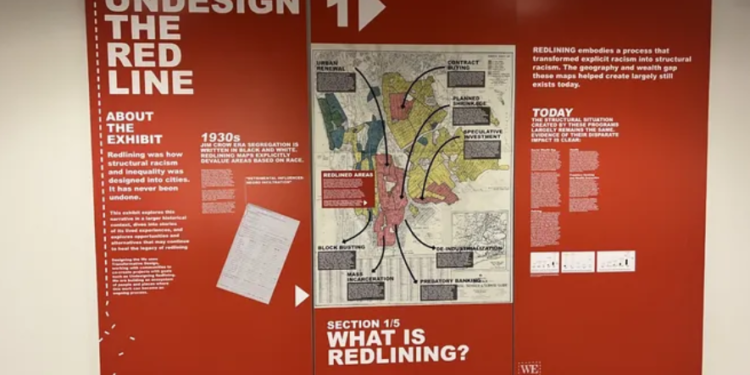Jan 30, 2025 Story by: Editor
In the late 1940s, Lynn Coleman’s family moved from Mississippi to the LaSalle Park neighborhood in South Bend, seeking refuge from the harsh realities of Jim Crow laws. However, they soon encountered another form of discrimination: redlining.
While the Fair Housing Act of 1968 outlawed redlining, its detrimental effects continue to reverberate across the nation, including in South Bend.
To shed light on this issue, a new interactive exhibit at the Main Branch of the St. Joseph County Public Library delves into the history of redlining, both locally and nationally, and invites viewers to consider the question: “How can we undesign redlining?”
Redlining, a discriminatory lending practice, involved banks denying mortgages to people of color and ethnic minorities, effectively blocking them from purchasing homes in specific neighborhoods. As a result, families of color were forced to reside in areas labeled as “hazardous,” where limited investment in infrastructure, business, and opportunities hindered their growth.
Three out of the exhibit’s five panels are already on display at the library, with the final two panels set to be unveiled on Tuesday. A public unveiling event will take place on Wednesday from 5 to 7 p.m. in the Main Library ballroom. The event will feature speakers from Designing the We, a New York-based design studio that collaborated on the exhibit, along with members of a resident advisory board who contributed personal stories and local history to the project.
The advisory board played a crucial role in creating the exhibit’s final panels, one of which outlines a timeline of redlining in South Bend, while the other showcases personal stories from local residents who experienced the harsh effects of redlining firsthand.
One of these stories is that of Lynn Coleman.
“The Swamp”
Coleman, now 68, recalls that LaSalle Park residents once referred to their neighborhood as “the swamp.”
“The part that we know of as the park now was the swamp area,” he shared. “Actually, it was a landfill where people would come and dump their garbage every week. … I lived on Kenmore Street. The dump started on the other side of our alley. We saw it, heard it, smelled it every day.”
Although Coleman lived in LaSalle Park until his early 20s and now resides south of the city, he fondly remembers how, despite the area’s disadvantages, most people in the neighborhood owned the property they lived on.
“There was a lot more pride in the community, in the neighborhood …,” he reflected. “You don’t see that as much now.”
Antonius Northern, the assistant director of business development for the City of South Bend, worked with Designing the We to organize the redlining exhibit. Northern noted that in the 1960s, around 80% of residents in LaSalle Park and Kennedy Park neighborhoods owned their properties. However, today, that number has dropped to between 30% and 39%.
Redlining’s Lasting Effects
The decline in property ownership is just one of the enduring consequences of redlining. When South Bend received a $75,000 Cities for Financial Empowerment grant from Bloomberg Philanthropies, Northern said the city chose to allocate some of the funds toward the redlining exhibit. According to Northern, redlining continues to influence financial empowerment, stability, the equitable distribution of wealth, and the racial wealth divide.
As highlighted in the exhibit’s second panel, redlining “built the American landscape we are familiar with today, with largely wealthy and white suburbs and concentrated poverty in diverse inner cities … This has contributed to issues today, including the racial wealth gap, unjust policing, health disparities, and predatory banking.”
Braden Crooks, co-founder of Designing the We, emphasized the long-lasting impact of redlining: “Redlining really embedded structural racism into so many systems, both in wealth and homeownership and also in geography and our neighborhoods.”
Crooks explained that the exhibit, which his team began working on in the summer with their South Bend partners, aims to illustrate how redlining deliberately created structural racism within cities.
“History isn’t just an artifact of the past,” Crooks said. “It’s something that impacts us today.”
The period from the 1930s through the 1960s was a time when the American middle class rapidly expanded. Yet, redlining blocked families of color from achieving the same upward mobility as white families.
“White families were benefitting from the G.I. Bill and building this ‘suburban American Dream,'” Crooks said. “And we deliberately cut people of color, and Black folks especially, out of benefitting from that. That was really rampant in South Bend, not only through banking, but also through racial restrictions and real estate practices.”
During this time, racially restrictive deeds prohibited the sale of homes to Black and Hispanic families, some of which are displayed in the exhibit.
Crooks admitted that the exhibit is “heart wrenching” as it prompts him to consider how South Bend might have looked had families of color been given the same opportunities as their white counterparts. “What would South Bend look like?” he asked. “Clearly, it was just a matter of opportunity … Many, many families of color ― many, many Black families ― would have joined the middle class had this system not existed. Instead, they got cut out, and they’re still cut out.”
A Vision for Rebuilding
Coleman, through his involvement in the exhibit, hopes to help rebuild communities like the one he grew up in.
“If we rebuild a neighborhood, we have to rebuild its people,” he said. “We have to give them the resources they need so they can maintain and upkeep the properties that they have. Then we have to educate, provide job opportunities, so that they can work and make money to pay for properties that they own, not rent.”
He also advocates for investing in local businesses and stores so that people can take pride in their neighborhoods.
“If not, we’ll be having these conversations all over again,” Coleman warned. “Hopefully, the next generation of people that live … in LaSalle Park can talk about the properties that they own.” Source: South Bend Tribune

















